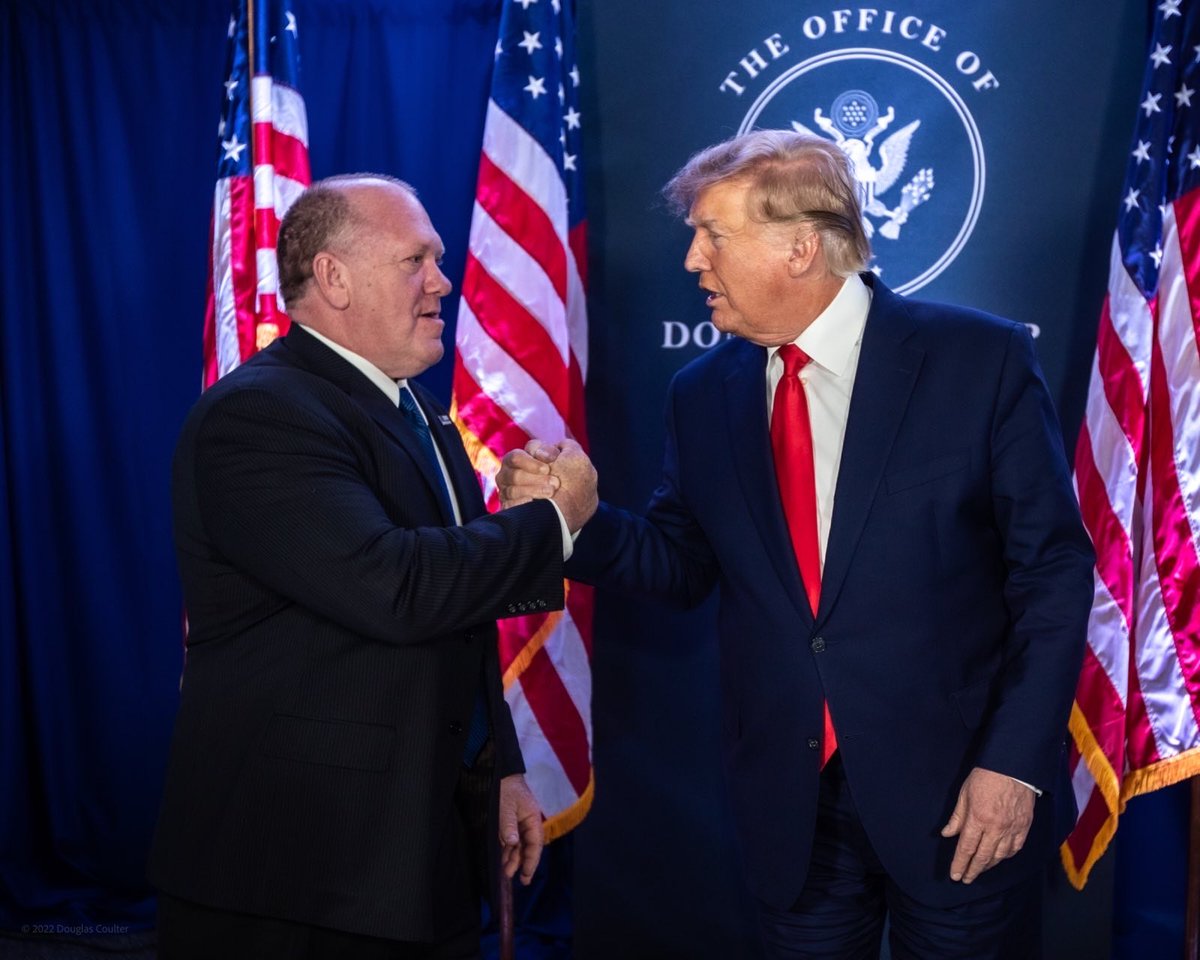The “out party” and their media lapdogs are back at it—howling, flailing, shrieking, and twisting the gears of what author Hunter S. Thompson would’ve called the “pale science of journalism” to win something political.
It’s a half-baked hustle designed to trip up even an experienced President. The modern Presidential sin is not to abscond with tax monies or even pardon one’s own son – the ultimate sin is trying to be a government chief executive officer who cuts budgets, lets unneeded employees find other jobs, and goes after waste, fraud and abuse.
The typical way the out party tries to control a new President is having a majority of the Congress, which balances things off and forces not only compromises but also deliberative processes between the branches. The Democrats don’t have that control in 2025, so their alternate strategy is the Great National Whine about how unfair MAGA is, how children are dying because Trump’s executive order indicates there are only two genders, and thus Trump is still Hitler. They also like interrupting Presidential speeches before the Congress, similar to what the communists and socialists did to Hitler in his early Beer Hall speeches. Our Dems acting like socialists and communists, the whining and gnashing continues.

Newly elected presidents decide executive branch priorities and how to keep campaign promises. If one has the time and sufficient allies in the Congress, a CEO President can push legislation. Nowhere in the constitution is it written a president should have a CEO’s business-like personality. But voters put it there. Last November, voters compared Kamala Harris’ and Donald Trump’s backgrounds and records and made a decisive choice for their CEO President.
Trump 2.0 has unleashed The Beast—chainsaw in hand. The Department of Government Efficiency—DOGE—was born from an executive order, a cold, ruthless machine designed to carve through and find the fat in already bloated executive branch, leaving little except soup bones. Critics, desperate and scrambling, scream that DOGE is little more than a glorified headhunter on steroids, targeting the heart of the bureaucracy. Under the slick guise of a “workforce optimization initiative,” some 75,000 federal employees have already cashed out with “deferred resignation” buyouts—a forced exile wrapped in a severance check.
And the Wall Street Journal says the bloodletting isn’t just personnel. DOGE has already hacked $2.6 billion from government spending, with more cuts lurking in the shadows. Trump’s message: Get lean or get lost.
Here’s more Jello. If you are a DOGE geek and want to cut $100 billion between now and next January, just decide not to lay the keel of the Navy’s newest proposed aircraft carrier, USS Doris Miller. Modern Navy carriers with their cost overruns are horribly expensive.
By the time you add the $13 billion ship, the Navy personnel, the new aircraft wing, maintenance, and seven to ten support ships in the carrier strike force, with cost overruns you’re looking at $100 billion.
Now, before the howling begins and people think all sorts of nasty CRT thoughts because Doris “Dory” Miller was the first black American hero of WWII, and due to have a carrier named for him, Miller is indeed a true American hero. He was awarded the Navy Cross for his heroics during the Japanese attack at Pearl Harbor.

Trump and Border Czar Tom Homan/White House photo
But what about Tech. Sgt. Ruben Rivers, 1st Lt. Vernon Baker, Sgt. William Thompson, Pfc. Andrew Jackson Smith and Cpl. Freddie Stowers, five of our black GI’s who were all awarded the Medal of Honor in Europe, several posthumously. Don’t they deserve ships?
Do we need a new one? We have 11 existing nuclear-powered carriers on station all over the world. Building aircraft carriers are a Cold War solution. As is being shown in the Ukraine war against Russia’s Black Sea fleet, the nature of naval warfare is seeing rapid changes, given the advancements in missile technology, drones, and other forms of modern warfare. Look at the submersible unmanned drone submarines what can make stealth attacks on surface ships. Aircraft carriers symbolize old style military power, but ship-launched missiles already can get to enemy targets quicker than Naval aircraft.
In addition to building ships we don’t need, what about giving Vietnam $2.5 million USAID to develop electric vehicle chargers? Present day Vietnam is a growing SE Asia powerhouse. VinFast is a Vietnamese car company that plan to establish a factory in 2028 to produce electric vehicles in North Carolina, creating 7,500 American jobs. The Vietnamese socialist government is turning out to be very good at capitalism, and under the 2023 U.S.-Vietnam Comprehensive Strategic Partnership (CSP), are becoming one of our best allies. Go figure. But hey! Can’t Hanoi buy electric vehicle chargers?
Historical Limitations. Congressional efforts to control and limit Presidential powers have been around since 1812. Examples include the 1812 War Powers Debate: The 2nd National Bank War (1832–1836), the pressures of the Whig Congress (1834-1838), andthe Nullification Crisis (1832-1833). The most noted effort was Congress’ enactment of the Tenure in Office Act in 1865 to limit the power of President Andrew Johnson to fire radical republican political appointees. Johnson’s ignoring of the Tenure act got him impeached, where he was narrowly acquitted.

Trump’s purge is far from over—at least, that’s the hope. But a twist is coming, and it’s ugly. Congressional Republicans are starting to squirm in their seats, muttering about tapping the brakes. MAGA Kansas Senator Roger Marshall got heckled at his Oakley townhall meeting and claimed some in the audience were paid to be there, a claim he since has walked back.
The Senators are reviewing the 1974 “impoundment law”— a last-ditch attempt for congress to keep control of the cash. The mountain of cash that both parties had been quietly stockpiling in the bowels of federal agencies for years. If there was one thing Congress would work in a bipartisan manner never to relinquish, it was the right to squander tax money. Reckless spending is the one tradition that unites them all. Remember in 2005 Alaska’s Bridge to Nowhere?
The most recent Congressional control efforts was the 1974 Impoundment Control Act of 1974. President Nixon had been impounding funds appropriated by a Democrat Congress in order to trim some of LBJ’s Great Society programs. Nixon opposed the impoundment law, but since the Congressional Democrats had veto proof majorities, he let it become law without his signature.
The impoundment law deals in recision packages. A rescission package is a formal proposal by the executive branch to Congress to cancel or reduce specific items of previously authorized budget spending. The idea is to rescind (or “take back”) funds that Congress previously allocated but which the executive branch now believes are unnecessary or inappropriate to spend. The recission can apply to individual programs or entire categories of spending.
Trump hasn’t yet suggested use of this law. He typically dislikes asking Congress for anything. Further, he may believe the 1974 law is dangerous, since in his first term he tried rescinding $15 billion in spending but failed to carry his own Republican Senate caucus. That was 2018. There are GOP Senators in the 2025 Senate whom Trump doesn’t like and has threatened to “primary” them. Their dislike is mutual. They may vote against his requests.
Economist Noah Smith explains Trump’s predicament.
If he loses and decides to simply refuse to spend money in the ways Congress has directed — perhaps through foot-dragging and creative readings of the letter of the law — it would count as a constitutional crisis. If Trump wins, then Congress can’t spend money — it can only [appropriate money and] recommend that the President spend the money.
Senators Rand Paul (R-KY) and Senator John Kennedy, (R-La) say a rescission package of previously approved funding requires only a simple majority GOP vote in both the GOP-controlled Senate and House to complete the recission. The Senators apparently think the GOP Senators on the 2025 team are stronger and better than in 2018.
If not, Trump can intentionally ignore the impoundment law, and when Congress takes him to court, if a court orders him to release the impounded fund, appeal the order to the Supreme Court. There, the entire Impoundment statute’s constitutionality will be at stake.
That’s high stakes political poker. And its only Year One of Trump 2.0.
-30-

Ron Smith – Special to The Informer
Dean Halliday Smith is a fifth generation Kansan, a retired attorney, a grandfather several times over, a Vietnam veteran, and a civil war historian. Territorial Kansas, the Civil War, and the post-Civil War west are his subjects of interest. Manhattan KS graduate, graduated Kansas Wesleyan in ’73. Worked on Governor John Carlin’s staff in 1980-81. Lobbied for the Kansas Bar Association for 14 years. His small farm is near where the historic Santa Fe Trail converged on the “Pawnee Fork” along the west route of the SFT. Check out Ron's western anthology writing at Amazon.




